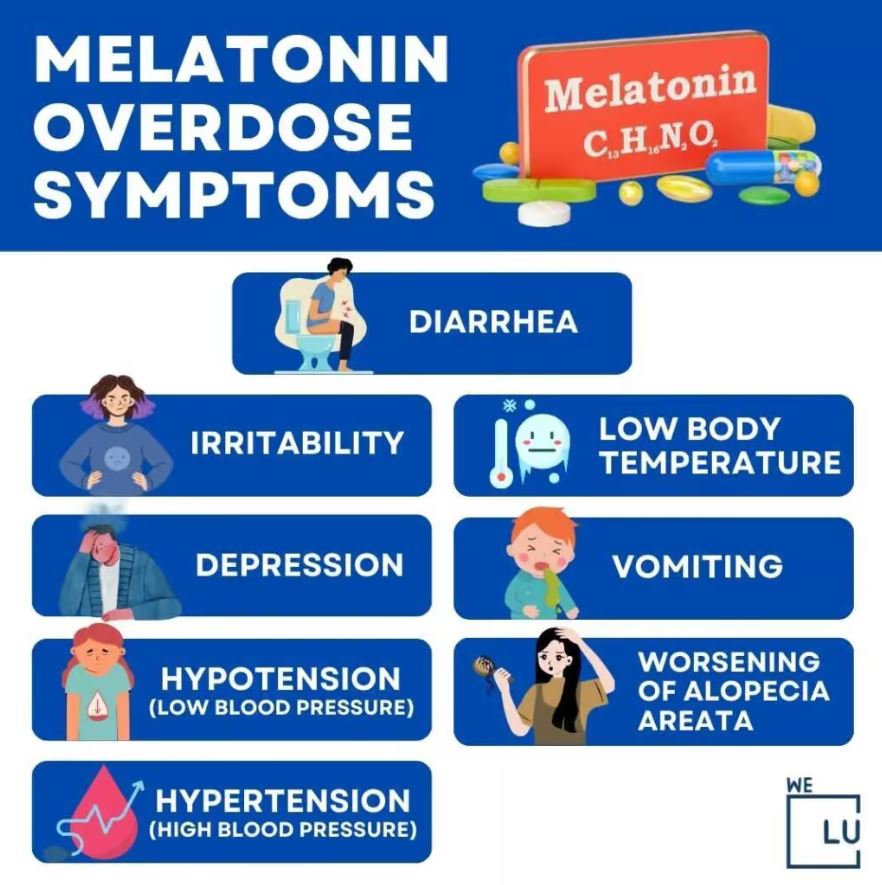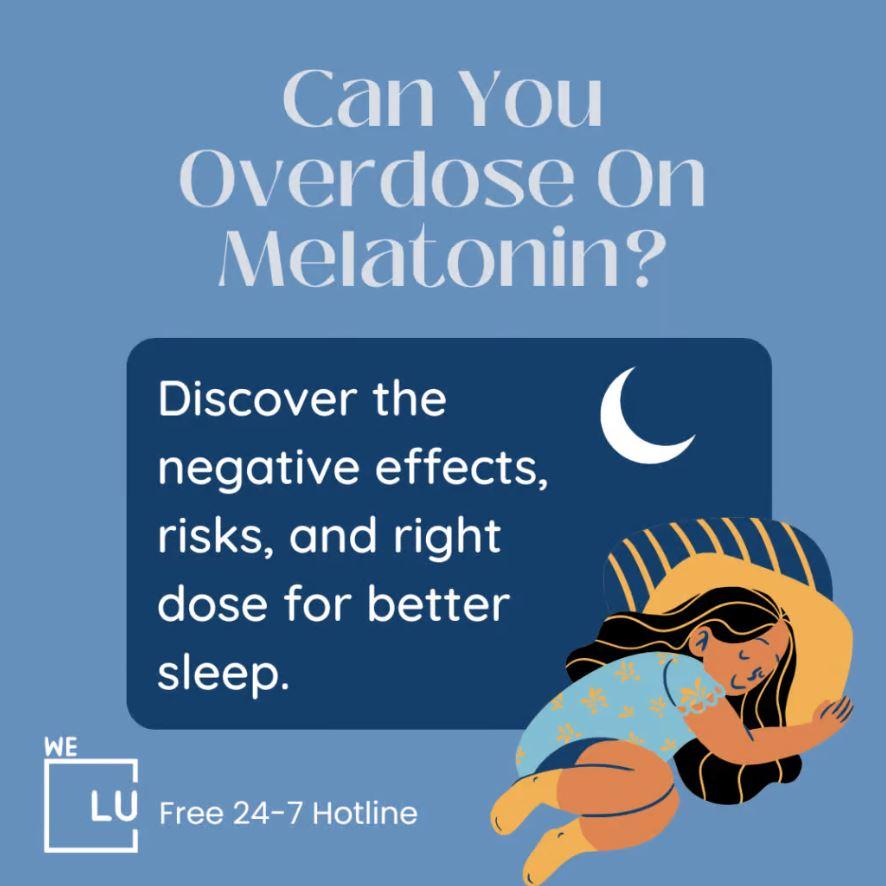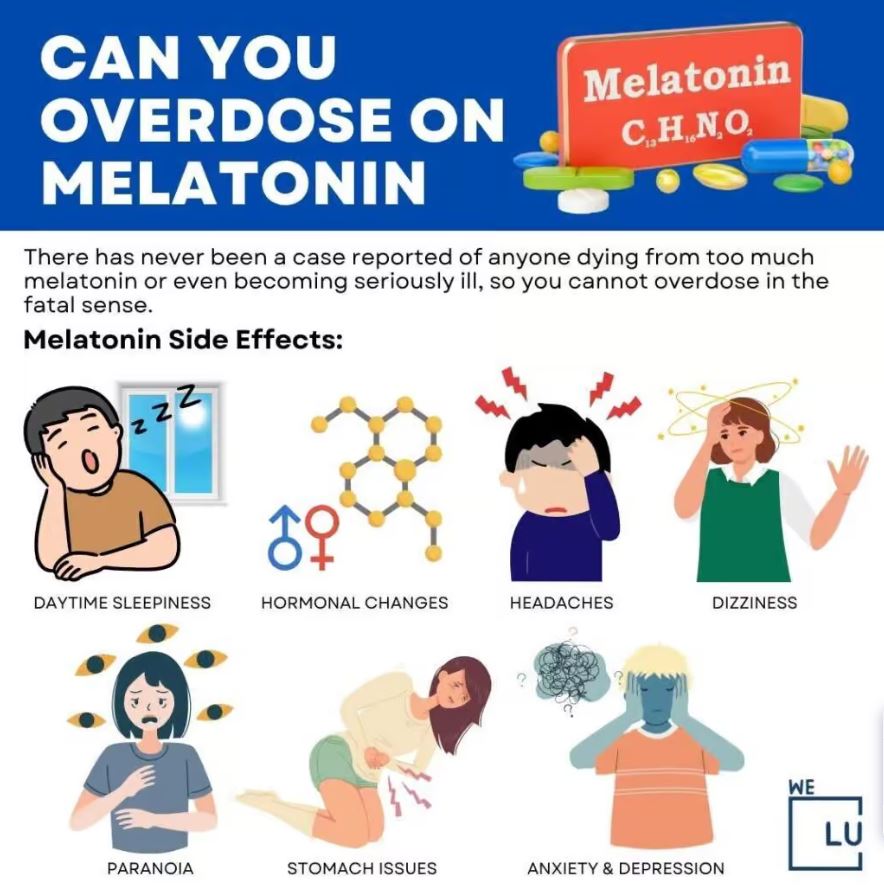Can You Overdose On Melatonin Pills?
Can you overdose on melatonin for adults? Melatonin is considered safe for short-term use when taken at appropriate doses. It is a natural hormone that regulates the sleep-wake cycle and is commonly used as a sleep aid. However, following recommended dosage guidelines is crucial, and consult a healthcare professional if you have any concerns or specific health conditions.
While it is uncommon to overdose on melatonin, taking excessively high doses can lead to potential side effects such as daytime drowsiness, headaches, dizziness, and digestive issues. It is always advisable to start with the lowest effective dose and gradually increase, if needed, under the guidance of a healthcare professional.
What is Melatonin?
Melatonin is a hormone naturally produced by the pineal gland in the brain. It plays a significant role in regulating the sleep-wake cycle and helps to maintain a consistent circadian rhythm. Melatonin levels typically rise in the evening, signaling the body to prepare for sleep. It then decreases in the morning to promote wakefulness.
Melatonin is also available in supplemental form as an over-the-counter sleep aid. It is commonly used to alleviate symptoms of insomnia, jet lag, and other sleep disturbances. Melatonin supplements can help regulate sleep patterns and promote more restful sleep.
Melatonin is not a sedative or a hypnotic drug like traditional sleep medications. Instead, it adjusts the body’s internal clock and promotes the natural sleep-wake cycle. Melatonin supplements are generally safe and well-tolerated when used appropriately and for short-term use.
Melatonin Overdose Symptoms
Can you overdose from melatonin? Yes. Melatonin overdose can occur when an individual takes excessive melatonin, typically exceeding the recommended dosage. Overdose may happen in several scenarios, including:
- Accidental ingestion: Taking more melatonin than intended due to confusion, misunderstanding of dosing instructions, or mixing up dosages.
- Intentional misuse: Purposefully taking large amounts of melatonin with the belief that higher doses will lead to better sleep or more potent effects.
- Combination with other substances: Taking melatonin with certain medications or substances that enhance its sedative effects, such as alcohol or certain tranquilizers. Mixing melatonin and alcohol can lead to extreme drowsiness, slowed breathing, impaired motor skills, memory problems, and an increased likelihood of accidents or injuries. It can even result in life-threatening situations, such as overdose or respiratory failure.
- Sensitivity to melatonin: Some individuals may be more sensitive to the effects of melatonin and experience overdose symptoms even with lower doses.

Melatonin Overdose Side Effects
In case of a melatonin overdose, specific symptoms may manifest. These side effects and symptoms can vary in severity based on the amount of melatonin consumed and individual factors. What happens if you overdose on melatonin gummies? Some possible symptoms of melatonin overdose include:
- Excessive drowsiness: Overdose of melatonin can intensify its sedative effects, leading to excessive sleepiness or grogginess.
- Headache: Some individuals may experience a headache due to a melatonin overdose.
- Nausea and gastrointestinal discomfort: Melatonin overdose can cause nausea, upset stomach, and digestive issues such as diarrhea.
- Dizziness: Feeling lightheaded or experiencing a loss of balance can be a symptom of a melatonin overdose.
- Hormonal imbalances: Overdosing on melatonin can potentially disrupt the natural balance of hormones in the body. However, this is more likely to occur with chronic overuse rather than an acute overdose.

Skip To:
Learn More:
- Effective Treatment for Melatonin and Alcohol Problems
- Can You Overdose on Sleeping Pills? Sleeping Pills Overdose Symptoms & Dangers. Sleeping Pill Overdose Emergency Treatment.
- Sleeping Pills and Alcohol
- Barbiturate Overdose Guide. Barbiturate Overdose Meaning, Barbiturate Overdose Symptoms, Signs, Effects, Dangers, & Treatment
- What Is A Prescription Pill Detox Program?
- Prescription Drugs Addiction Causes & Symptoms
- 10 Most Abused Prescription Drugs In The US
- Withdrawal Symptoms of Prescription Drugs
- Risks of Mixing Prescription Drugs With Alcohol
Can You Overdose On Melatonin? Infographic
The specific amount of melatonin that constitutes an overdose can vary from person to person. Melatonin is generally well-tolerated; even high doses typically do not cause severe harm or overdose on melatonin death.
While melatonin overdose is generally rare, the risk of overdose may indeed increase when melatonin is mixed with other drugs or substances. Combining melatonin with certain medications or substances that have sedative effects, such as alcohol, benzodiazepines, or opioids, can enhance the sedative properties of melatonin and potentially lead to overdose symptoms.
Embed the below “Can you Overdose on Melatonin?” Infographic to your website. The We Level Up addiction treatment center team provides this “Can you overdose on melatonin?” infographic. To use the above infographics, you agree to link back and attribute its source and owner at https://welevelup.com/addiction/can-you-overdose-on-melatonin/
“Can you overdose on melatonin?” infographic image link: https://welevelup.com/wp-content/uploads/2023/06/Melatonin-Overdose-2.jpg

How Long Does A Melatonin Overdose Last?
Can you overdose melatonin? Yes. If a melatonin overdose occurs, the duration of symptoms may depend on the individual’s metabolism and the amount of melatonin ingested. Symptoms can range from a few hours to potentially lingering for a day or more. Common symptoms of a melatonin overdose, such as excessive drowsiness, headache, nausea, and dizziness, should gradually subside as the body metabolizes and eliminates the excess melatonin.
To prevent melatonin overdose, it is advisable to follow recommended dosage guidelines and consult with professional healthcare if you have any concerns or specific health conditions.
First-class Facilities & Amenities
World-class High-Quality Addiction & Mental Health Rehabilitation Treatment
Rehab Centers TourRenowned Addiction Centers. Serene Private Facilities. Inpatient rehab programs vary.
Addiction Helpline(844) 597-1011Proven recovery success experience, backed by a Team w/ History of:
15+
Years of Unified Experience
100s
5-Star Reviews Across Our Centers
10K
Recovery Success Stories Across Our Network
- Low Patient to Therapist Ratio
- Onsite Medical Detox Center
- Comprehensive Dual-Diagnosis Treatment
- Complimentary Family & Alumni Programs
- Coaching, Recovery & Personal Development Events
How Much Melatonin Does It Take To Overdose?
How much melatonin to overdose? The recommended melatonin dosage for sleep support typically ranges from 0.5 to 5 milligrams (mg), taken about 30 minutes to an hour before bedtime. Higher doses of melatonin, such as 10 mg or more, are sometimes used in clinical settings for specific purposes. Still, it’s crucial to use such amounts under the guidance of a healthcare professional.
Can overdose on melatonin be life-threatening? While there is no universally defined lethal dose of melatonin, extremely high doses can lead to overdose symptoms. Exceeding the recommended dosage significantly, such as taking several tens of milligrams or even hundreds of milligrams, may increase the risk of overdose.
Melatonin Drug Facts
Recommended Melatonin Dosage for Adults
Synthetic melatonin is a dietary supplement. The FDA does not control or regulate supplements. Therefore, melatonin is not officially FDA-approved for any indication.
Melatonin supplements are generally safe and well-tolerated when used appropriately and for short-term use.
The recommended melatonin dosage for adults can vary based on individual needs, sleep issues, and response to the supplement. It’s generally advised to start with the lowest effective dose and adjust as needed. Here are some general guidelines:
- For sleep onset difficulties: A typical starting dosage for adults is 0.5 to 1 milligram (mg), taken 30 minutes to 1 hour before bedtime. This low dose can be gradually increased, but finding the minimum adequate quantity that works for you is crucial.
- A higher melatonin dosage may be appropriate for shift work sleep disorder or jet lag. A 1 to 5 mg dosage taken close to the desired bedtime at the destination or work shift can help synchronize sleep patterns. However, it’s still recommended to start with the lowest effective dose.
Melatonin Drug Interactions
It’s crucial to be aware of potential drug interactions to ensure safe and effective use of melatonin. Here are some common examples of melatonin-drug interactions:
- Sedatives and tranquilizers: Melatonin may enhance the sedative effects of benzodiazepines, barbiturates, and other sedatives.
- Blood-thinning medications: Melatonin may interact with anticoagulant or antiplatelet drugs, such as warfarin or aspirin, potentially increasing the risk of bleeding.
- Antidepressants: Combining melatonin with these medications may alter melatonin’s effectiveness or increase the risk of side effects.
- Diabetes medications: Melatonin might affect blood sugar levels. Regular monitoring of blood sugar levels and appropriate medication adjustments may be necessary.
- Immunosuppressant medications: Melatonin could interfere with the effectiveness of these medications.
It’s crucial to inform your healthcare provider about all medications, supplements, and health conditions you have before starting melatonin.

Get Your Life Back
Find Hope & Recovery. Get Safe Comfortable Detox, Addiction Rehab & Dual Diagnosis High-Quality Care.
Hotline(844) 597-1011Melatonin Overdose-Related Statistics
It is crucial to use sleeping pills as prescribed, follow recommended dosages, and seek medical attention if an overdose is suspected. If you or someone you’re concerned with is experiencing a medical emergency due to a potential overdose, it is necessary to call emergency services immediately.
8.4%
In 2020, 8.4 percent of US adult citizens took sleep pills in the last 30 days, every day or most days, to help them fall or stay asleep.
Source: CDC
9,711
In 2019. 9,711 individuals died of a benzodiazepine-related overdose in 2019. Benzodiazepines are used as sleeping pills.
Source: CDC
10.2%
Women (10.2 percent) were more likely than men (6.6 percent) to take medication for sleep, and drug use was generally raised with age.
Source: CDC
Can You Die From Overdose On Melatonin?
Melatonin overdose is generally not considered life-threatening. Melatonin overdose death case is rare, as melatonin is a hormone naturally produced by the body. However, taking extremely high doses of melatonin can cause severe drowsiness, confusion, and other adverse effects.
While rare, complications can arise, especially when combined with other medications or alcohol. Mixing melatonin and alcohol can be harmful. Both substances have sedative effects, and when used together, they can intensify each other’s depressant effects on the central nervous system. This can lead to excessive drowsiness, impaired coordination, and an increased risk of accidents or injuries.
It is always advisable to follow the recommended dosage guidelines and seek medical attention if you suspect a melatonin overdose or experience severe symptoms.
Can You Overdose On Melatonin Gummies?
Can you overdose on melatonins? While it is possible to overdose on melatonin gummies, the risk is relatively low if taken as directed. Melatonin gummies typically contain a specific dose per gummy, which is indicated on the packaging. However, consuming excessive amounts of melatonin gummies can lead to an overdose.

Get Help. Get Better. Get Your Life Back.
Searching for Accredited Drug and Alcohol Rehab Centers Near You?
Even if you have failed previously and relapsed, or are in the middle of a difficult crisis, we stand ready to support you. Our trusted behavioral health specialists will not give up on you. When you feel ready or just want someone to speak to about therapy alternatives to change your life call us. Even if we cannot assist you, we will lead you to wherever you can get support. There is no obligation. Call our hotline today.
(844) 597-1011Melatonin Overdose Treatment & Prevention
Treatment for melatonin overdose typically focuses on managing the symptoms and providing supportive care. Here are some steps that may be taken in the treatment of melatonin overdose:
- Seek Medical Attention: If a melatonin overdose is suspected, it is crucial to seek medical support as soon as possible. Contact emergency services or a poison control center for guidance.
- Medical Evaluation: A healthcare professional will assess the individual’s condition, including symptoms’ severity and potential complications. They may conduct tests to determine the extent of the overdose.
- Symptom Management: The healthcare professional will provide appropriate treatment to manage the overdose symptoms. This may include interventions to address excessive drowsiness, confusion, or other associated symptoms.
- Supportive Care: Supportive care may be provided to ensure the individual’s safety and well-being. This can include monitoring vital signs, giving intravenous fluids if necessary, and addressing complications.
Prevention of melatonin overdose involves adhering to the recommended dosage guidelines and following these tips:
- Use as Directed: Take melatonin only as directed by the healthcare professional or according to the instructions on the packaging. Do not exceed the recommended dosage.
- Avoid Combining with Other Substances: Be cautious when combining melatonin with other substances, including alcohol and medications, as they may interact and increase the risk of adverse effects.
- Discuss with a Healthcare Professional: If you have any underlying medical conditions, are taking other medications, or have concerns about melatonin use, consult a healthcare professional before starting or changing the dosage.
Can you overdose.on melatonin? Yes. Mixing sleeping pills with alcohol is highly discouraged and can be extremely hazardous. Both melatonin and alcohol are central nervous system depressants that can cause sedation and impair coordination and judgment. Combining them increases the risk of excessive sedation, respiratory depression, and other serious health consequences.
The combination can lead to extreme drowsiness, slowed breathing, impaired motor skills, memory problems, and an increased likelihood of accidents or injuries. It can even result in life-threatening situations, such as overdose or respiratory failure. It is crucial to avoid mixing sleeping pills and alcohol and follow healthcare professionals’ guidance regarding safe and appropriate use.
If you or a loved one is struggling with sleeping aids addiction or other substance use disorder(s), call a FREE consultation 24/7 at (561) 678-0917
Get FREE addiction treatment insurance check – https://welevelup.com/rehab-insurance/
Experience Transformative Recovery at We Level Up Treatment Centers.
See our authentic success stories. Get inspired. Get the help you deserve.
Start a New Life
Begin with a free call to an addiction & behavioral health treatment advisor. Learn more about our dual-diagnosis programs. The We Level Up Treatment Center Network delivers recovery programs that vary by each treatment facility. Call to learn more.
- Personalized Care
- Caring Accountable Staff
- World-class Amenities
- Licensed & Accredited
- Renowned w/ 100s 5-Star Reviews
We’ll Call You
Top 5 Can You Overdose On Melatonin’s Pills? FAQs
-
Can I overdose on melatonin?
Melatonin is generally safe for most individuals when taken in appropriate doses. However, it is still possible to overdose on melatonin if high amounts are consumed. Symptoms of melatonin overdose may include drowsiness, confusion, headaches, and changes in blood pressure. Following the recommended dosage instructions are crucial, and consult with professional healthcare if you have any concerns.
-
What happens when you overdose on melatonin?
When someone overdoses on melatonin, they may experience symptoms such as excessive drowsiness, lethargy, and confusion. Higher doses of melatonin can also lead to headaches, nausea, and dizziness. Melatonin overdose is generally not life-threatening, but seeking medical attention is recommended if someone has taken it excessively or if severe symptoms occur.
-
Is it possible to overdose on melatonin and Benadryl?
Yes, it is possible to overdose on both melatonin and Benadryl. Taking excessively high doses of these substances can lead to various symptoms and complications. An overdose of melatonin can cause excessive drowsiness, confusion, and headaches. In contrast, an overdose of Benadryl can result in extreme sleepiness, rapid heart rate, blurred vision, and even seizures. It is crucial to follow the advised dosage instructions for these medications and seek medical attention if an overdose is suspected.
-
Can melatonin overdose kill you?
Melatonin overdose is generally not considered life-threatening, as melatonin is a hormone naturally produced by our body. However, extremely high doses of melatonin can cause severe drowsiness, confusion, and other adverse effects. While rare, exercising caution and following recommended dosage guidelines is crucial.
-
Can you overdose on melatonin gummy?
While melatonin gummies are generally safe when taken as directed, it is still possible to overdose on them if consumed excessively. The exact dosage and potency of melatonin gummies can vary, so it’s crucial to follow the instructions on the packaging.
Barbiturates Sedatives Hypnotics Effects, Warnings, Overdose Risks, Drug Facts, Detox & Treatment
Melatonin is often compared with barbiturates. While both substances can impact sleep, they differ in their mechanism of action, safety profile, and legal status. It is crucial to use medications, including sleep aids, under the guidance of a healthcare professional, following recommended dosage guidelines, and considering individual health factors and needs.
Learn more about barbiturate medications and overdose risks by clicking the video below.
Barbiturates Sedatives Warnings Video Transcript
Welcome to the We Level Up treatment center video series. In today’s video, we will discuss What are Barbiturate Overdose Risks, Use, Effects, Withdrawal & Addiction Treatment Options?
What are barbiturates? Barbiturates are drugs used to treat anxiety, epilepsy, and sleeplessness. They are a type of central nervous system depressant that can potentially establish habits and be addictive. Overdosing on barbiturates can lead to respiratory depression, overdose, and even death.
Synthetic barbiturates drugs slow down the central nervous system. Barbiturates are used as sedatives or depressants, hypnotics, anticonvulsants, and as a component of anesthesia. Their effects range from mild sleepiness to coma. Barbiturates can also be used to relax patients before surgery. Barbiturates can make someone appear inebriated or drunk at relatively low doses.
Barbiturates are addictive. Those who take them develop a physical dependence on them. It may be fatal to stop using them (barbiturate withdrawal). Barbiturates’ ability to modify mood quickly leads to tolerance with continued use. Repeated usage increases the likelihood of developing severe poisoning as resistance to the fatal effects takes longer.
What are barbiturates used for?
Few substances are used in medicine today compared to the 1900s when barbiturates were first made available. In the past, barbiturates were frequently given to treat anxiety, sleeplessness, and depression. The National Institute of Health claims that Barbiturates are drugs that cause sleepiness and relaxation. A barbiturate overdose occurs when a patient consumes more of this medication than is typical or advised. Either by chance or by purpose, this may occur.
A barbiturate overdose poses a serious health risk. Therefore, it is no longer advised to use barbiturates as hypnotics or sedatives to ease daytime restlessness or insomnia brought on by everyday pressures. Due to these potentially fatal adverse effects, safer drugs have replaced barbiturates in many applications.
Barbiturates are mostly used today to treat severe and extreme cases of insomnia. These medications occasionally function as an adjuvant to anesthesia and aid in controlling epilepsy episodes. Barbiturates are classified as Schedule II, III, and IV depressants under the Controlled Substances Act, according to the US Drug Enforcement Agency.
What is the definition of barbiturates?
Like sleeping pills, barbiturates are defined as “downers.” They function by reducing the activity of your nervous system and brain. The individual feels at ease as a result. Barbiturates can impair memory and judgment. Barbiturates can also produce mood changes and make users furious, despondent, and exhausted. They are more harmful when misused because they are stronger than most sleeping pills. This medicine can cause tolerance in users, who then use it more frequently. When used frequently and for an extended period, they might weaken muscles, harm the liver, and damage bones.
Never mix two different medication types. Taking barbiturates along with heroin or alcohol is extremely risky. Alcohol, heroin, and barbiturates all reduce brain and nervous system activity. Because the neurological system regulates respiration, combining these medicines increases the risk of a barbiturate overdose, which increases the likelihood that the user will cease breathing and pass away.
Experience Transformative Recovery at We Level Up Treatment Centers.
See our authentic success stories. Get inspired. Get the help you deserve.
Start a New Life
Begin with a free call to an addiction & behavioral health treatment advisor. Learn more about our dual-diagnosis programs. The We Level Up Treatment Center Network delivers recovery programs that vary by each treatment facility. Call to learn more.
- Personalized Care
- Caring Accountable Staff
- World-class Amenities
- Licensed & Accredited
- Renowned w/ 100s 5-Star Reviews
We’ll Call You
Search We Level Up Can You Overdose On Melatonin? Detox, Mental Health Topics & Resources
Sources:
[2] Savage RA, Zafar N, Yohannan S, et al. Melatonin. [Updated 2022 Aug 8]. In: StatPearls [Internet]. Treasure Island (FL): StatPearls Publishing; 2023 Jan-. Available from: https://www.ncbi.nlm.nih.gov/books/NBK534823/
[3] Guardiola-Lemaître B. Can you overdose on melatonin? Toxicology of melatonin. J Biol Rhythms. 1997 Dec;12(6):697-706. doi 10.1177/074873049701200627. PMID: 9406047.
[4] Tordjman S, Chokron S, Delorme R, Charrier A, Bellissant E, Jaafari N, Fougerou C. Melatonin: Pharmacology, Functions and Therapeutic Benefits. Curr Neuropharmacol. 2017 Apr;15(3):434-443. doi 10.2174/1570159X14666161228122115. PMID: 28503116; PMCID: PMC5405617.
[5] FDA About Melatonin – Food & Drug Administration (FDA)
[6] Sleep Aids and Stimulants (Continued) – Centers for Disease Control and Prevention (CDC)
[7] Melatonin: MedlinePlus Supplements – https://medlineplus.gov/druginfo/natural/940.html
[8] Lie JD, Tu KN, Shen DD, Wong BM. Pharmacological Treatment of Insomnia. P T. 2015 Nov;40(11):759-71. PMID: 26609210; PMCID: PMC4634348.
[9] Hu Z, Oh S, Ha TW, Hong JT, Oh KW. Sleep-Aids Derived from Natural Products. Biomol Ther (Seoul). 2018 Jul 1;26(4):343-349. doi 10.4062/biomolther.2018.099. PMID: 29929351; PMCID: PMC6029681.
[10] Sleep Disorder (Sedative-Hypnotic) Drug Information – Food & Drug Administration (FDA)


